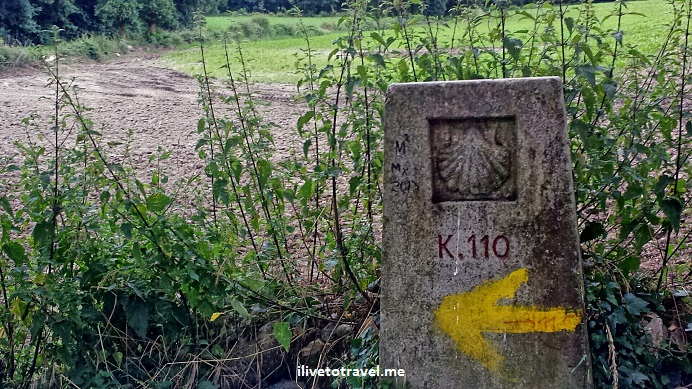As I explained in an earlier post, I had limited time for doing the Camino de Santiago as I was also spending time before the trek doing work with a children’s center in Morocco. So, instead of starting on the French side of the Spain-France border as many do to get to Santiago de Compostela, we started in Sarria, west of León, 110 kms from the end point in Santiago de Compostela. How long does the Camino take, then, depends on the approach you take. Just with these two possible routes, the difference is considerable.
Doing the Camino de Santiago starting in Sarria
From my starting point, Sarria, it would take us a week to reach the destination of this pilgrimage. Had we started on the French border, it would have taken about thirty days. That would have required crossing the Pyrenees, not easy I hear. Clearly, any starting point in between, would take somewhere in the middle. Of course, your own pace will also affect how long it takes. I would like to think, our pace was average.

Before we started doing the Camino de Santiago
The itinerary though had us visiting O Cebreiro and Samos (site of an important monastery) prior to starting the trek. The early-day visits did not leave us much time on day 1 to hike. So we hiked a very short distance that day going from Sarria to Barbadelo, a small town with a very nice small hotel “Casa Barbadelo” where we spent the night. No matter what, we were excited to get going!

I am certainly glad to have seen O Cebreiro and Samos before we got going. However, it sure made for a long day on the road. Therefore, I was, along with my fellow trekkers, eager to get on the Camino for real. Though the hike that day was very short (1.5 hours or so), it was a good warm-up.


What the trail was like on this first day
The terrain we crossed went by some major highway but it was very rural and lush, crossing farms along the way. It felt isolated enough for one to contemplate life – within and outside each of us. During the trek, we sometimes clung together as we walked, chatting or quietly. Other times, we separated a little bit though always staying within sight of each other. It was not about someone wanting to get there faster or someone being too slow. It was just that sometimes each of us may have wanted to feel a little “aloneness” (not the same as “loneliness” in my book).


The highlight of the short walk that day was crossing a 12th century bridge named the Aspera bridge that crosses the Celeiro River. How many people, pilgrims and locals alike, have trodden its weathered surface over almost a millennium… Humbling thought.

One of the best parts of doing the Camino de Santiago is what comes when the day ends!
We did enjoy arriving at Casa Barbadelo where we shared three rooms among eight of us.

The rooms at Casa Barbadelo were basic but spacious. In addition, the buildings in Casa Barbadelo were quite new and the hotel grounds were nice. To boot, the hotel even had a pool, though we did not opt in.

We enjoyed a GREAT meal and lots of good laughs that night accompanied (or triggered?) by one or two glasses of sangria. A perfect ending to a long but short (does that make sense?!), easy first day on the Camino de Santiago!
If you want to see what the next day was like doing the Camino de Santiago, go on to day 2!
For tips on how to pack for this awesome trek, read here.
On a different topic, the work I did before the trek was in Morocco, in the coastal town of Essaouira. It was a Morocco I could not envision. A town I could easily spend months in. Not the usual chaos of Marrakesh or other towns. Check it out!
Pin this image to your planning board if you are thinking of doing the Camino de Santiago. Or just if you want to bookmark this post!


Leave a Reply